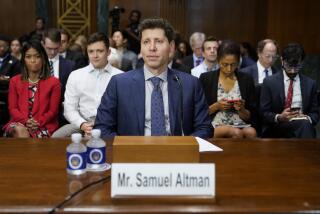The Talk of Flanders Has Most Speechless
- Share via
IEPER, Belgium — As 2000 dawned, the people of Flanders couldn’t have been prouder of Jo Lernout.
The former high school science teacher’s ideas about speaking to and through computers made him a player on the world’s high-tech stage, an elbow-rubber with the likes of Belgium’s royals and Bill Gates. Shares in his software company soared. His neighbors fervently poured their savings into what looked to be a sure winner in the new economy.
“Greed suddenly knew no limits,” recalled Paul Lambert, a retired railroad worker. “Everybody wanted more.”
Now, as the year comes to an end, these same investors in northern Belgium are sick with worry after Lernout & Hauspie Speech Products’ spectacular crash amid accusations of financial misdeeds.
Thousands of them follow the company’s legal twists and turns like a soap opera on evening newscasts, desperate for hints that any of their investments could be salvaged.
About $10 billion in market value evaporated as L&H; shares sank from more than $72 each on the Nasdaq market in March to less than a dollar in the last month on the over-the-counter market.
In early December, some shareholders bicycled for hours to the Ieper courthouse for a hearing at which L&H; was denied bankruptcy protection. Lining the aisles in the small hall, they watched Lernout squirm on a narrow wooden bench, his lips pressed tightly together, while a commercial judge castigated him for submitting a poor restructuring plan.
Grim jokes are told in the bars lining the Ieper’s old market square. One making the rounds keyed on Lernout’s talent for hype: “Now L&H; and Goodyear will develop a tire together. Goodyear does the rubber, L&H; the hot air.”
The company’s downfall started during the summer, when the Wall Street Journal reported on its questionable accounting practices in Asia, including $100 million in missing cash at its South Korean unit. L&H; eventually admitted “errors and irregularities” in its bookkeeping over most of the last three years.
A company audit released this month said there were also accounting problems at L&H;’s U.S. headquarters in Burlington, Mass., but on a lesser scale.
Auditors concluded that “the combination of the rapid growth experienced by L&H; and the market pressure to meet expectations appear to have resulted in a loss of focus on the rules and regulations governing public companies, and a failure to appreciate the need for increasing and stronger controls.”
After the revelations, Lernout, 53, was forced to resign as chairman. He and co-founder Pol Hauspie, an accounting wizard, were also ousted from the company’s board of directors.
Freddy Laplace, chairman of the Ieper Chamber of Commerce, whose office faces L&H;’s red brick-and-glass headquarters, said Lernout knew how to sell his vision.
“He made it sound that by talking to your belt buckle, you’d be able to start your stove 20 miles away,” Laplace said.
L&H; was founded in 1987 and grew to be a world leader in speech and language technology, an unproved but sexy market. Its products allow people to use their normal speaking voice to dictate documents and control their computers. It also makes translation software and software that reads aloud text documents on a computer.
“It was a technological issue people could understand,” Jef Vuchelen, economics professor at Brussels University, said of the investor appeal of L&H.; “Who didn’t believe in the long-term prospects of speech technology?”
The Flanders regional government funded the fledgling company through its public investment company, GIMV, making the fortunes of L&H; a matter of Flemish pride.
L&H; “was extremely important as a precursor of the new economy. Flanders has so few start-ups,” said former Flemish Minister-President Luc Van den Brande in a magazine interview. “We don’t have raw materials, only our hands and brains.”
The company was supposed to provide Ieper, a region of 35,000 also known as Ypres, with about 6,000 jobs. But so far, direct employment stands at about 500.
Investors were further impressed when Microsoft Corp. put $45 million into the company, with Intel Corp. adding $30 million more. Stock market madness reached its zenith in March, when L&H; acquired Dictaphone, the venerable U.S. company that provides 60% of U.S. hospitals with digital dictation and recording products.
At that time, just before the bookkeeping irregularities were made public, Lernout said his company was “more Catholic than the Pope,” a claim that reverberated strongly in the staunchly Roman Catholic region.
About 15,000 mostly local small shareholders have joined forces and are considering the Belgian version of a class-action lawsuit. And L&H;’s personnel, long silent because much of their income was linked to stock options, is increasingly restive.
“We are worried about the future because there are so many open questions remaining,” said representative Geert Wybo.
There are, however, some enduring believers.
“I remain full of hope that the small investor will get his money back,” said Tom Casteur, who filed a lawsuit against a journalist who questioned L&H;’s integrity.
Casteur refused to blame the local boys. Instead, he hints at a plot from across the Atlantic to steal the European company’s secrets.
“Are the Americans scared that a Belgian company has become this strong in technology?” Casteur asked.
When John Duerden was brought from Dictaphone to run the company, it renewed rumors that Americans would leave Ieper to waste, while L&H; assets in the United States, where bankruptcy protection has been granted, would be saved.
“There’s a plot theory, with the U.S. trying to suppress Europe,” said Vuchelen of Brussels University. “It’s something from the 1960s, totally absurd.”
More to Read
Inside the business of entertainment
The Wide Shot brings you news, analysis and insights on everything from streaming wars to production — and what it all means for the future.
You may occasionally receive promotional content from the Los Angeles Times.










